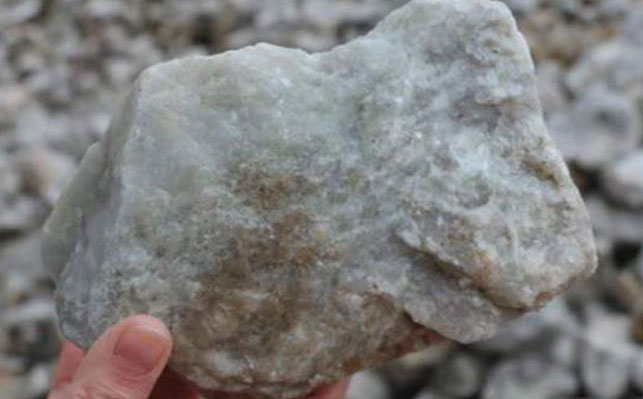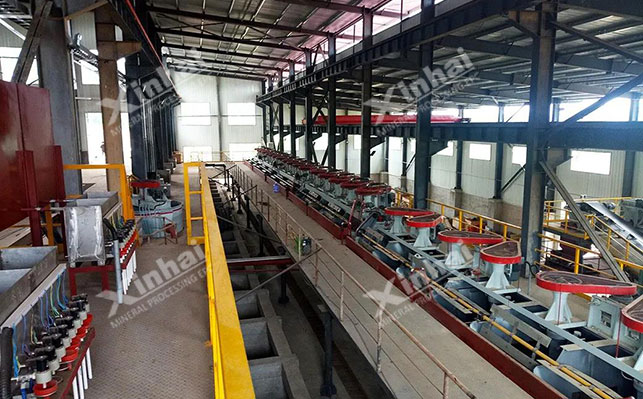
15311826613
Click to add WeChatAt the moment when the new energy industry is booming, lithium resources, as the main raw material for lithium-ion batteries, have become increasingly strategically important. In addition to common lithium ore resources such as spodumene and lithium mica, carbonate clay lithium ore is also a resource for obtaining lithium, and it has entered people's field of vision as an emerging lithium ore resource. So what are the carbonate clay lithium ore beneficiation processes? Let's find out together!
Carbonate clay lithium ore is a special lithium ore resource that exists in the weathering crust of carbonate rocks. This type of ore uses clay minerals as the main carrier and contains a certain amount of carbonate minerals. It is mostly loose, porous and fine-grained in appearance. Its formation is closely related to long-term geological weathering. During the weathering process, the lithium-containing parent rock undergoes physical, chemical and biological effects, and lithium elements are gradually enriched in clay minerals and carbonate minerals.

The mineral composition of carbonate clay lithium ore is relatively complex. The main clay minerals include montmorillonite, kaolinite, illite, etc. These clay minerals have a large specific surface area and strong adsorption capacity, so that lithium elements exist in them in the form of ion adsorption and isomorphism. Carbonate minerals are mainly calcite, dolomite, etc. In addition, they may also contain a small amount of silicate minerals such as quartz and feldspar, as well as oxides and hydroxides of metals such as iron and manganese. The mineral particle size of this type of lithium ore is usually less than 0.074mm, and some even reach the micron level. This fine particle size makes the ore easy to agglomerate during the beneficiation process, increasing the difficulty of solid-liquid separation.
Although the average grade of carbonate clay lithium ore is relatively low and it is a difficult beneficiation type, it still has a high development and utilization value if a reasonable beneficiation process is used. The commonly used beneficiation methods of carbonate clay lithium ore are mainly flotation, acid leaching, alkali method and salt roasting-water leaching method.
The flotation of carbonate clay lithium ore is mainly based on the difference in physical and chemical properties of the surface of each mineral. Then, through the auxiliary effect of the reagent, the surface of the lithium mineral is forced to be hydrophobic, and then attached to the bubble and floated to the surface of the pulp to form a foam layer, while the gangue minerals remain in the pulp, thereby realizing the separation of lithium minerals from gangue minerals. The types of reagents used are mainly collectors, frothers and regulators. The function of the collector is to change the surface properties from hydrophilic to hydrophobic; the frother produces a large number of stable bubbles in the pulp; the regulator is used to adjust the pH value and other properties of the pulp to create favorable conditions for flotation.

The flotation method is suitable for carbonate clay lithium ore with large differences in surface properties between lithium minerals and gangue minerals. For some lithium minerals with coarse particle size and good floatability, the flotation method can obtain better sorting effect. In addition, the flotation method can also be used in combination with other mineral processing methods to improve the recovery rate of lithium and the grade of concentrate.
Acid leaching is a method of extracting lithium by using the chemical properties of strong acids. Commonly used strong acids include sulfuric acid, hydrochloric acid, etc. During the acid leaching process, these strong acids will react chemically with the lithium minerals in the carbonate clay lithium ore, breaking the chemical structure of the lithium minerals, so that the lithium element is released from the mineral lattice in the form of ions and enters the solution. Then the carbonate minerals, clay minerals, etc. in the ore will also react with the acid and dissolve, thereby leaching the lithium element into the solution together with other impurities, and then a series of separation and purification operations will be performed to separate lithium from impurities.
Acid leaching is suitable for various types of carbonate clay lithium ores, especially when dealing with ores with low lithium grade and high impurity content. When the ore contains a large amount of carbonate minerals, the reaction between acid and carbonate during the acid leaching process can quickly dissolve the carbonate, creating more favorable conditions for the leaching of lithium elements, so that the acid leaching method can efficiently leach lithium elements.
Alkali method for lithium extraction mainly uses strong alkali (sodium carbonate, sodium hydroxide, etc.) as a reaction reagent to react chemically with lithium minerals in the ore under high temperature conditions to form soluble lithium salts. In this process, the alkali not only reacts with lithium minerals, but also with clay minerals, carbonate minerals, etc. in the ore, destroying their structure and causing lithium elements to be released from the complex mineral structure. The products after the reaction are subjected to water leaching, filtration and other operations to dissolve the soluble lithium salts into water, thereby realizing the extraction of lithium elements.
Alkali method for lithium extraction is suitable for processing carbonate clay lithium ores with high silicon content. For some ores containing a large amount of silicate minerals such as quartz and feldspar, alkaline method for lithium extraction can effectively extract lithium elements while dissolving silicates.
The salt roasting-water leaching method is to roast the ore after mixing it with salts such as sodium sulfate and potassium sulfate. During the high-temperature roasting process, the salt reacts chemically with the lithium minerals in the ore, causing the structure of the lithium minerals to change and generate soluble lithium salts. The roasted product is then subjected to water leaching, filtration and other operations to allow the lithium element to enter the solution, and the solution is subsequently treated to extract the lithium element.
This method is suitable for all types of carbonate clay lithium ores, especially when dealing with ores with complex lithium occurrence states. For lithium in the form of ion adsorption and isomorphism, the salt roasting process can effectively convert it into a soluble lithium salt, thereby increasing the lithium leaching rate and creating conditions for subsequent extraction.
The above is an introduction to the beneficiation process and ore characteristics of carbonate clay lithium ore. In actual mineral processing plants, there are many methods for lithium selection. In addition to the above methods, there are also new methods and combined methods. As for how to choose a suitable method, it is necessary to listen to mineral processing test analysis and design a method that meets the conditions of its own lithium ore according to the actual situation. This is an effective method.